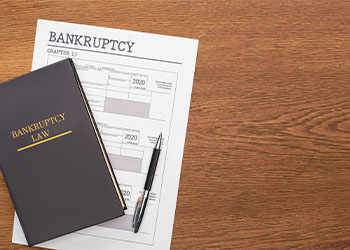The Differences Between Chapter 7 & Chapter 13
Sept. 29, 2022
 Bankruptcy is all about the numbers. There is the amount of money you owe, the amount of income you earn, and the amount of money it will take to satisfy your debts. Even the names of different categories of bankruptcy are numbers: Chapters 7, 9, 11, 12, 13, and 15. Especially if you don’t have a head for numbers, it can all get quite confusing.
Bankruptcy is all about the numbers. There is the amount of money you owe, the amount of income you earn, and the amount of money it will take to satisfy your debts. Even the names of different categories of bankruptcy are numbers: Chapters 7, 9, 11, 12, 13, and 15. Especially if you don’t have a head for numbers, it can all get quite confusing.
Two of the most common types of bankruptcies are Chapter 7 and Chapter 13. If you are considering bankruptcy, you may be wondering which chapter you should file under. At Vivona Pandurangi, PLC, we can help, just as we have helped hundreds of clients seeking a financial do-over in Falls Church, Alexandria, Arlington, Fairfax, and Manassas, Virginia, and those in Loudon, Arlington, Fairfax, and Prince William counties.
To get started, here are a few differences between Chapter 7 and Chapter 13 bankruptcy and what financial relief you may achieve from them.
What Should I Know About Chapter 7 Bankruptcy?
Although not all debt can be discharged in bankruptcy, a Chapter 7 bankruptcy discharges all debt that can be. However, in Chapter 7, dischargeable debts are eliminated after any non-exempt assets you have are liquidated and divided among your creditors. This chapter is commonly referred to as the “liquidation bankruptcy.”
To be eligible for Chapter 7, either your income must be below Virginia’s median income or you must pass a means test. In 2022, the median income for a household of one is $5,659.83 monthly or $67,918.00 annually. If your income exceeds the median but your debts and necessary household expenses leave little or nothing to repay debt, you may qualify based on a means test analysis.
What Does Chapter 7 Take Care Of?
A Chapter 7 bankruptcy can wipe the dischargeable debt slate clean, which will basically include all unsecured debt such as credit cards, medical debts, or payday loans. You may also be able to discharge unpaid income taxes.
It can also discharge secured debt, such as the mortgage on your home or an auto loan. However, you typically need to surrender your home and vehicle to do so, but you may be able to protect up to $25,000 in home equity. Moreover, Chapter 7 does not protect assets of value, such as a baseball card collection, expensive jewelry, or family heirlooms. The bankruptcy trustee will liquidate such items of value and divide the proceeds among your creditors.
What Debts Can’t Be Eliminated in Chapter 7 Bankruptcy?
Chapter 7 bankruptcy cannot discharge such things as back child support and alimony. You also cannot discharge debt if the creditor has a judgment against you. This would include, for example, if the hospital has a judgment against you for unpaid medical expenses or if a landlord took you to court and received a judgment against you for back rent.
If you are considering maxing out your credit cards and getting a payday loan or two before you file, don’t. The bankruptcy court considers that to be fraud, and you will be unable to discharge any fraudulently acquired debt.
Should I File for Chapter 7?
Since Chapter 7 will not discharge all debt, you need to make sure it will wipe out enough debt for you to manage the rest while continuing to pay your routine monthly expenses and avoiding the accumulation of additional debt.
There are some signs that may point to filing for Chapter 7, such as buying groceries using credit cards, making only minimum payments on credit cards, making late payments, and being contacted frequently by debt collectors. If the stress of your financial situation is taking a toll on your mental and physical health, your work, or your personal relationships, you should consider bankruptcy relief.
What Should I Know About Chapter 13 Bankruptcy?
Chapter 13 is commonly referred to as the “wage-earners bankruptcy” because it restructures your debt rather than simply discharging it. Efforts are made to negotiate with creditors to reduce the debt you owe; then your payments are restructured in a way that allows you to pay off your debt in three to five years.
Chapter 13 filers must be individuals, not businesses. There are maximum limits to what your secured and unsecured debt may be to file. You also have to prove to the court that you hold a steady job earning a steady income that is sufficient enough for you to continue paying your basic living expenses, make ongoing debt payments, and pay off the debt included in the repayment plan.
What Does Chapter 13 Do and Not Do?
As with a Chapter 7 bankruptcy, the court issues a stay order upon filing. The court order prohibits creditors from foreclosing on your home or obtaining a judgment against you. As such, it may be the answer to keeping your home, car, or other secured debt, as well as giving you additional time to pay off unsecured debt. It provides the opportunity catch up on overdue payments and make paying off debt manageable. As with Chapter 7, Chapter 13 does not give you a pass on back child support or alimony.
Is Chapter 13 Bankruptcy a Fit for Me?
Chapter 13 is a good option if your income is above the Virginia median and you cannot pass the means test. That means you are making enough money to repay your debt if it can be restructured in a way that makes doing so feasible.
Why Should I Talk to a Bankruptcy Attorney?
It is true that you do not need a bankruptcy attorney to represent you when filing for Chapter 7 or Chapter 13. However, working with one may be the best financial decision you have made in a long time.
Your attorney can review your income, assets, and debts and help you explore your options for filing for bankruptcy. Your attorney will work with you to ensure that all debt that should be included in your bankruptcy filing is, because if you leave something out, it will not be discharged, renegotiated, or restructured. If you want to keep your home, your attorney will be able to give you the legal advice you need to know whether that’s possible and how to do it.
Get the Facts: Vivona Pandurangi, PLC
If you live in Falls Church, Alexandria, Arlington, Fairfax, or Manassas, Virginia, and you are considering bankruptcy, you should call Vivona Pandurangi, PLC and put our years of experience representing clients seeking financial relief to work for you. We pride ourselves on being knowledgeable, experienced, and honest with our clients. At Vivona Pandurangi, PLC, we tell you what you need to hear, even if it’s not what you hoped to hear. Call today to schedule a consultation.
